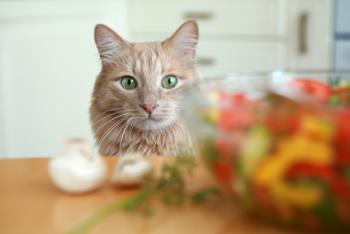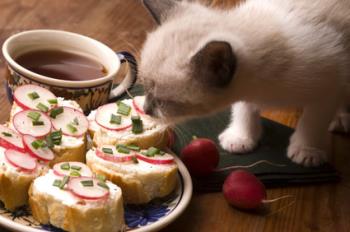
There are various reasons why a person might decide to become a vegetarian, and at one point or another, someone who has made that transition may wonder: what about their pets? Should a cat become vegetarian, if his owner decides to exclude meat from his or her own diet? Is it even possible for a cat to be a vegetarian?
While we cheer vegetarians and vegans for choose a lifestyle they believe in and standing by it, cats are pure meat eaters. In the wild, and even in the household environment, a cat should not eat anything but meat and animal organs.
Does this sound cruel? In reality, it’s natural. More importantly, it’s central to a cat’s health. Cats’ bodies are built to digest animal products, and they lack several features to completely digest plant-based foods like grains, berries, and sugars.
Cats are obligate carnivores and should not be vegetarians
Biologists, when categorizing animals by their diets, divide them into three main groups: carnivores, herbivores, and omnivores.
- Carnivores – those who eat meat, e.g. dogs and cats;
- Herbivores – those who eat plant-based food, e.g. cattle and sheep;
- Omnivores – those who eat both meat and plants, e.g. humans and pigs.
These are only the main groups. Within them are smaller ones. For example, dogs are able to digest carbohydrates found in plants and vegetables; therefore, they are often referred to as “omnivorous carnivores.” Cats, on the other hand, lack this ability, and so fall into the group known as “obligate carnivores.”
Being an “obligate carnivore” means that you must eat animals in order to survive. Also, it means your body is not able to digest carbohydrates properly. Domestic cats have both of those features, which makes it hard for them to become vegetarians!
Cats don’t eat any veggies in the wild

Many dog and cat foods nowadays contain plants, such as grain, in huge amounts. Some even have grains as the main ingredient. There are even some completely vegetarian cat foods that contain grains, potato, broccoli, and not a tiny bit of meat.
However, if you have read our article about what cats eat in the wild, you should know cats’ natural diets mostly consist of rodents, birds, insects, and reptiles. There is not a bit of plant-based material in the natural diet of cats.
If a cat would not eat any vegetarian food in the wild, why would you force him to do so in the domestic environment?
Would you eat grass? It is eaten by many species, after all. Still, you would avoid it, because your body is not able to digest and receive energy from it.
Cats’ bodies have evolved to catch, eat, and digest meat
Let’s talk about the anatomy of a cat. The first difference between animals who eat plants and those who eat meat is their appearance. Cats are well-known as hunters, and as you can see in our infographic, almost every part of their bodies contains advantages for catching prey.
That does not tell us anything for sure, however, because humans, who are also good at hunting, can turn to a vegetarian diet easily. So, let’s not talk about what cats can do. Let’s focus on what cats are not able to do. Which is eating and digesting plants and vegetables. That’s right, cats are not able to digest plants properly!
The main features that tell us cats are not good at the vegetarian lifestyle are as follows:
- Cats have a smaller number of molars. Molars are teeth built to grind plant material.
- Cats’ jaws move only vertically, not horizontally. This, too, prevents the grinding necessary for proper digestion of plant-based food.
- Cats don’t have amylase in their saliva. Amylase is an enzyme that catalyzes the breakdown of the complex carbohydrates found in plants.
- Cats do not chew their food, which is an essential activity for digesting the carbohydrates found in plants.
- Cats have short small intestines (relative to their body length). This allows fast-spoiling foods to pass through quickly, but it prevents the absorption of complex foods, such as starches in plants.
- Cats’ bodies do not produce sufficient amounts of certain vitamins, like Vitamins A and D. Therefore, they must receive these vitamins by ingesting meat.
- Cats’ bodies require the presence of 12 essential amino acids, but their bodies cannot produce these in sufficient amounts. Therefore, they must receive most of them through ingestion. The best known of these is Taurine, which is not found in any plant-based food.
The points listed above are only the main, specific reasons why cats would have a hard time becoming vegetarians. Their bodies are not ready to consume and digest plant-based foods, and they would not receive necessary nutrients from those foods.
There is one more point to discuss. And it is commercial vegetarian cat foods.
But they make vegetarian cat food, and those cats are alright
What about the vegetarian cat foods sold in stores? Why are we telling you that cats cannot eat vegetarian food while plenty of such products are available for purchase, all of which are deemed on their packaging to be “tested,” “approved,” “complete,” “balanced,” and “nutritious?”
The most important thing to mention here is that it’s extremely difficult to assess how nutrition affects health because the effects it has take time to occur. In reality, we do not know if the cats eating vegetarian food are alright. It takes a whole life to asses dietary effects, and even then we still wouldn’t know for sure.

No one develops diabetes or other food-related issues overnight. It takes years, and diet is not the only factor influencing the outcome. Besides, incomplete nutrition does not always affect the body in noticeable ways. Many people nowadays eat junk, but they seem well. They may not, in truth, be completely well, but they do not complain. And as we know, cats rarely complain.
To really evaluate vegetarian cat food, researchers would need to conduct a study covering several years. Over this period, one group of cats would be fed a vegetarian diet, and another group would be fed regular cat food. We have not yet heard of such a study being performed, but there have been studies showing specific vegetarian cat foods to be nutritionally incomplete.
Vegetarian cat food manufacturers achieve their goal by using vegetarian ingredients and supplementing chemicals for what they lack. These additions include synthetic Taurine, Vitamins A, D, and E, certain other amino acids, and so on. The result is what they claim to be nutritious, vegetarian cat food. Which is, by the way, labeled “complete and balanced.”
But did you know that science is not yet able to tell what truly constitutes complete and balanced food for cats? We have pet food manufacturing guidelines by the “Association of American Feed Control Officials,” but these are not a rulebook, and the limitations set forth contain wide ranges. The simple truth is that no one knows exactly what cats’ nutritional needs are. Not in the regular cat food industry, nor in the vegan cat food industry.
Heck, nutritionists have not been able to achieve similar results for humans. For instance, let’s say someone wanted to create a food, intended for humans, out of grass. Grass is a valid food for many species but not for humans.
Theoretically, it’d be possible to create such food by supplementing it appropriately. But scientists do not know how to do it, and they would not want to. Why? Because people wouldn’t want to eat it. The project would be a commercial failure.
Meanwhile, there has been a lot of money invested in creating vegetarian cat foods based off of incomplete scientific advances. Why? Because cats don’t think for themselves, and many newly forged vegetarians are easy prey for marketing companies. Don’t let that happen to you. If you are strong enough to drop meat products from your diet, you are strong enough to overcome this. In the wild, cats eat nothing but meat and animals, and they should not be vegetarians. It’s cruel.
Sources:
- Linda P. Case, et al. “Canine and Feline Nutrition: a Resource for Companion Animal Professionals, 3rd edition,” Mosby Elseveir, 2011.
- Lynn Curtis, “Feline Nutrition: Nutrition for the Optimum Health and Longevity of your Cat,” Lynn Curtis, 2011.
- K. R. Schultze, “Natural Nutrition for Dogs and Cats: The Path to Purr-fect Health” Hay House, Inc., 2008.
- Association of Veterinarians for Animals Rights, “Vegetarian and Vegan Cat and Dog Diets,” 2006.
